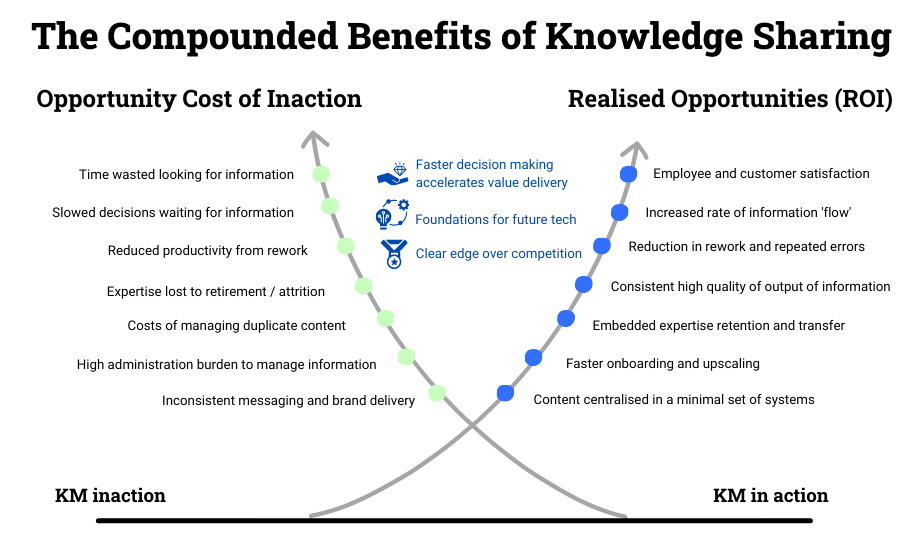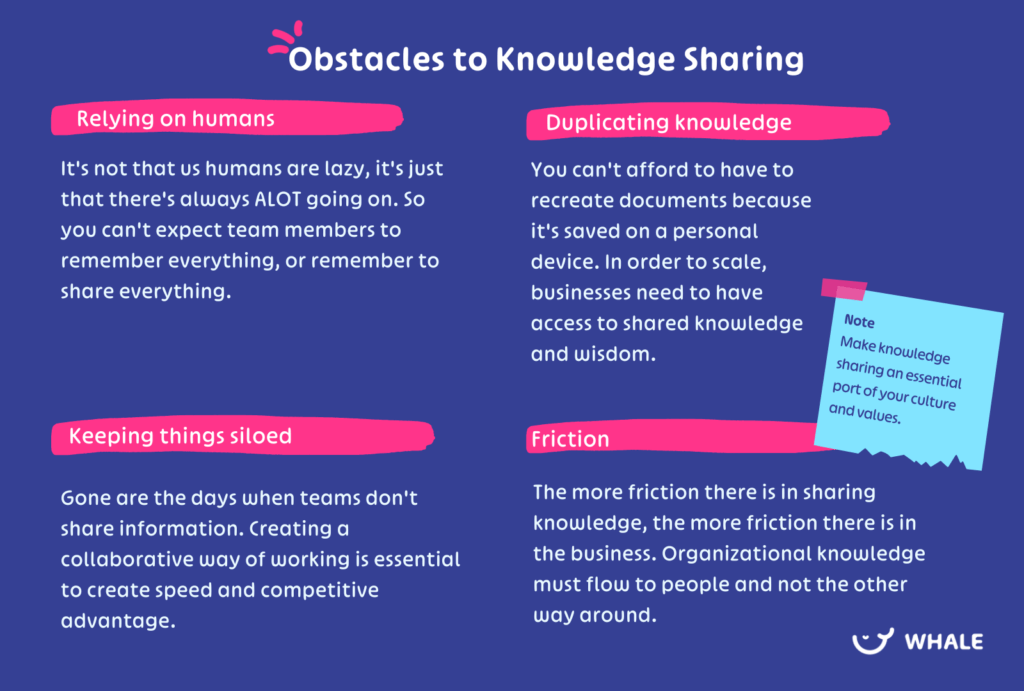Looking to boost your company’s performance?
We can show you how knowledge sharing is the Imagine your company is losing millions of dollars annually due to inefficient knowledge sharing. The collective knowledge possessed by your team is one of your company’s most valuable assets, driving smooth operations, individual employee success, and a competitive edge.
However, team knowledge can only expand if employees consistently share information. This guide provides actionable strategies to cultivate a thriving knowledge-sharing culture in your organization.
What is Knowledge Sharing?
Knowledge sharing is the process of exchanging information, ideas, and experiences among individuals or groups. It involves sharing expertise within an organization, as well as with external stakeholders. There are different types of knowledge that can be shared:
- Explicit Knowledge: Information that is easily codified, documented, and transferable in a formalized manner, such as manuals, reports, and procedures.
- Tacit Knowledge: Knowledge gained through personal experiences, insights, and skills that is difficult to express or communicate in words.
- Implicit Knowledge: Knowledge embedded in an organization’s practices, processes, and culture.
What is knowledge sharing vs knowledge management?
The search for Knowledge Management (KM) Yields 2,840,000,000 results on Google, with the Oxford Dictionary defining KM as "Efficient handling on information and resources with a commercial organization.
While often used interchangeably, it’s important to distinguish between knowledge management and knowledge sharing. Knowledge management refers to the efficient handling of information and resources within a commercial organization.
Knowledge Sharing is more broadly defined as the exchange of information and know-how to help others and to collaborate with others to solve problems, develop new ideas, or implement policies or procedures.
“How do you manage knowledge in an effective, sustainable way? Start by thinking of it as knowledge sharing, not knowledge management.”
CIO Magazine Tweet
Why is Knowledge Sharing Important in the Workplace?
Knowledge isn’t just an asset—it’s a competitive advantage. But when information is trapped in silos or scattered across teams, productivity slows, collaboration weakens, and valuable insights are lost. That’s why fostering a culture of knowledge-sharing is essential. It keeps teams aligned, boosts efficiency, and fuels innovation.
Why Knowledge Sharing Matters
Boosts Productivity
– Employees spend nearly 20% of their workweek searching for information. A strong knowledge-sharing culture ensures they can quickly access what they need, reducing wasted time and increasing efficiency.Improves Collaboration & Innovation
– When teams openly share knowledge, they break down barriers between departments, sparking new ideas and problem-solving together.Enhances Knowledge Retention
– Employees come and go, but their expertise doesn’t have to. A structured knowledge-sharing system ensures critical insights are documented and passed on.
Increases Employee Engagement & Growth
– People thrive in environments where they can learn and contribute. Encouraging knowledge-sharing empowers employees, fosters a sense of ownership, and supports professional development.Gives a Competitive Edge
– Companies that continuously share and update knowledge stay agile in an ever-evolving market. The more informed your workforce, the better equipped your business is to adapt and innovate.
At its core, knowledge sharing isn’t just about making work easier—it’s about building a smarter, more connected, and future-ready organization. How does your company encourage knowledge sharing?

Barriers to Knowledge Sharing
Despite the clear benefits, several barriers can hinder effective knowledge sharing:
- Knowledge Silos: Departments working in isolation, hindering communication.
- Knowledge Hoarding: Employees intentionally withholding information.
- Lack of Opportunity: Limited social interaction, especially in remote work environments.
- Cultural Resistance: A company culture that does not actively encourage sharing leads to information hoarding, crippling innovation and growth.
- Trust Deficits: Without mutual trust, employees hesitate to share valuable insights, fearing misuse or underappreciation of their contributions.
- Inadequate Technology: Lack of tools for easy access and dissemination of information creates significant barriers to effective knowledge sharing.
- Time Constraints: High-pressure environments where employees may feel they do not have the time to share or document their knowledge effectively.
- Lack of Incentives: Without proper incentives or recognition, employees might not feel motivated to share their knowledge.

How to Improve Knowledge Sharing: 9 Ways to Make it Work
To overcome barriers and foster a knowledge-sharing culture, organizations need to implement comprehensive strategies that touch every aspect of their operations. Here’s how to build an effective knowledge-sharing environment:
1. Build a Culture That Promotes Knowledge Sharing
Creating a knowledge-sharing culture starts with establishing a clear mission and vision that emphasizes the value of collective learning. Organizations must foster a growth mindset where employees feel encouraged to share both successes and failures. This requires building a sense of community where knowledge sharing becomes second nature, not an obligation. Most importantly, organizations need to reinforce psychological safety so employees feel secure sharing their insights without fear of judgment or criticism.
2. Design for Humans to Make it Easy to Share and Preserve Knowledge
Successful knowledge sharing depends on accessibility and convenience. Organizations should provide multiple communication channels that cater to different sharing preferences and needs. This includes implementing regular knowledge-sharing sessions and ensuring there are robust systems in place to store and preserve information for long-term access. The easier it is for employees to share and access knowledge, the more likely they are to engage in the process.
🌟 TOP TIP: Integrate your tools into the apps where your team works, to make accessing company information seamless. For example, the Whale Chrome extension brings information to your team when and where they need it.
3. Centralize Your Knowledge to Create a Single Source of Truth
A centralized knowledge base serves as the foundation for effective information sharing. By implementing knowledge base software with superior search functionality, organizations can ensure that all employees have access to accurate, up-to-date information. This single source of truth eliminates confusion, reduces duplicate efforts, and ensures consistency across the organization.
4. Define Roles and Responsibilities
Clear role definition is crucial for successful knowledge sharing. Organizations should assign specific roles within knowledge-sharing initiatives and designate experts and learners for targeted knowledge transfer. This structure helps ensure that knowledge flows efficiently and that everyone understands their responsibilities in the sharing process.
5. Standardization of Knowledge Sharing Workflows
Effective knowledge sharing requires clear processes and standards. Organizations need to clarify what knowledge should be shared, define specific roles and responsibilities, and standardize methods for both sharing and receiving information. This standardization helps ensure quality and consistency while making the sharing process more efficient and predictable.
6. Leadership Buy-In and Advocacy
An organization’s success is highly influenced by how efficiently it can tap into its resources of data and knowledge. One way to think about it is to imagine you could clone your CEO and have him sit beside your team while they onboard new customers or have your CTO on hand to oversee your engineering team’s product updates? Now you can.
Leadership support is essential for successful knowledge sharing. C-level executives and leaders must actively champion knowledge-sharing initiatives.
🌟 TOP TIP: Make sure you integrate knowledge transfer in your business to facilitate faster onboarding and training, and ultimately business growth.
7. Establish Clear Objectives and Expectations
Knowledge-sharing efforts must align with strategic organizational goals. Organizations should clearly articulate how knowledge sharing contributes to achieving broader objectives and set clear expectations for participation. This alignment helps employees understand the value and purpose of knowledge-sharing activities.
8. Provide the Right Tools and Technologies
Technology plays a crucial role in modern knowledge sharing. Organizations should invest in user-friendly platforms that make it easy to share and access information. This includes adopting new tools and methodologies that enhance the knowledge-sharing process while ensuring they integrate well with existing workflows.
Thanks to AI, gone are the days when documenting company information and sharing it with team members takes time.
These days with tools like Whale, you can
- Use AI to create SOPs in seconds
- Start with a template
- Get a consultant to help you document
🌟 TOP TIP: Check out the templates on Whale.
9. Measure and Analyze Knowledge Sharing Effectiveness
Regular measurement and analysis help optimize knowledge-sharing initiatives. Organizations should track key performance indicators related to knowledge sharing and regularly assess and refine their strategies. This data-driven approach ensures continuous improvement and helps demonstrate the value of knowledge-sharing efforts.

Calculate your ROI
When you’re choosing a documentation & training solution for your team, you want to know what return you can expect.
Leveraging Technology for Knowledge Sharing
Technology plays a crucial role in facilitating knowledge sharing.
- Knowledge Management Software: Utilize tools such as online collaboration platforms, social media, knowledge base software, and intranet systems.
- AI-Powered Solutions: Leverage AI in enterprise search, authoring tools, and SOP creation to enhance efficiency and accessibility.
- Centralized Knowledge Base: Implement a centralized knowledge base to streamline information access and reduce redundancy.
- Mobile Accessibility: Ensure mobile apps are available for on-the-go access.
- Content Structure: Prioritize well-structured and engaging content.
How to Choose a Knowledge-Sharing Tool?
We designed Whale specifically for scaling organizations because we built key features into our solution to enable small and medium enterprises to scale fast.
Regardless of your size, however, key functionality considerations and features should be part of the decision-making process when choosing a Knowledge Sharing tool.
We highlighted some of the key features to consider:
- Is it easy to document and create content on the platform?
- Is it easy to onboard and train team members?
- Does it have an option to help you migrate content?
- Does it integrate into your working apps?
- Does it have a mobile app on iOS and Android?
- Does it feature a Rich Media Editor?
- Are there templates to get you started?
- Does it feature an image & GIF library?
- Can you integrate video?
- Does it provide reporting?
- Does it have QR Code capability?
- Is it cloud and/or app-based?
- Does it feature an intuitive structure and interface?
- Can you allocate team members to oversee certain knowledge?
- Does it have social proof and reviews from other companies?
Present and Future Trends of Knowledge Management
- AI-Powered Tools: Integration of AI to automate knowledge capture, organization, and delivery.
- Enhanced Enterprise Search: AI-enhanced search capabilities for more efficient knowledge retrieval.
- Focus on User Experience and 💡 Design for Humans: Designing tools that are intuitive and seamlessly integrated into daily workflows.
- Mobile Accessibility: Ensuring knowledge is accessible on various devices.
- Personalization: Tailoring knowledge delivery to individual needs and roles.
Bottom Line
A thriving culture of knowledge sharing is essential for building resilient and innovative organizations. By implementing the strategies discussed and leveraging the right tools, businesses can unlock their team’s full potential, drive growth, and stay competitive in today’s fast-evolving market. Embrace a future where knowledge is not just stored but shared, celebrated, and continually enhanced.
FAQs about knowledge sharing
What are the Future Challenges of Knowledge Management?
- Resistance to Change: Overcoming resistance to adopting new knowledge-sharing practices.
- Information Overload: Managing and filtering vast amounts of information to ensure relevance.
- Maintaining Data Security: Protecting sensitive information while promoting sharing.
- Measuring Effectiveness: Tracking the impact of knowledge sharing on organizational goals.
Can you highlight Examples of Knowledge Sharing in Practice?
- “Lunch and Learn” Sessions: Informal gatherings where employees share knowledge.
- Digital Knowledge Repositories: Centralized hubs for documents, best practices, and tutorials.
- Cross-Departmental Collaborative Projects: Projects that encourage the exchange of skills and insights across departments.
What are obstacles to knowledge sharing in the workplace?
Several factors can hinder knowledge sharing at work, impacting the overall efficiency and potential of a business:
Cultural Resistance: If a company culture does not actively encourage sharing, information hoarding becomes the norm, severely crippling innovation and growth.
Trust Deficits: Without mutual trust, employees hesitate to share valuable insights, fearing misuse or underappreciation of their contributions.
Inadequate Technology: Lack of tools for easy access and dissemination of information creates significant barriers to effective knowledge sharing.
Organizational Silos: Isolated departments lead to duplicated efforts and missed collaborative opportunities, stalling organizational efficiency.
Time Constraints: In high-pressure environments where employees are constantly under time constraints, they may feel they do not have the time to share or document their knowledge effectively. This can lead to significant gaps in organizational knowledge. (The irony is that the less knowledge is sharing, the longer it takes to complete a task!).
Lack of Incentives: Without proper incentives or recognition, employees might not feel motivated to share their knowledge. Recognition can be a powerful motivator for employees to contribute their insights and experiences.
How Do You Measure Knowledge Sharing Success?
- Knowledge Base Usage Metrics: Track page views, questions asked, document downloads, and user engagement
- Employee Participation Rates: Monitor the percentage of employees contributing to knowledge sharing
- Time Savings: Measure reduction in time spent searching for information
- Employee Satisfaction Surveys: Gather feedback on knowledge sharing effectiveness
- Project Completion Times: Track improvements in project delivery speed
How Do You Motivate Employees to Share Knowledge?
- Recognition Programs: Highlight top contributors in company communications
- Gamification: Implement point systems or badges for active participation
- Career Development: Link knowledge sharing to professional growth opportunities
- Mentorship Programs: Create structured programs for sharing expertise
- Performance Reviews: Include knowledge sharing as a key performance indicator
What's the Role of AI in Knowledge Sharing?
- Automated Content Organization: AI helps categorize and tag content automatically
- Smart Search Capabilities: AI improves search accuracy and provides contextual relevance
- Content Recommendations: AI suggests relevant content based on user behavior
- Document Summarization: AI creates quick summaries of lengthy documents
- Knowledge Gap Identification: AI highlights areas where knowledge is missing or outdated
How Do You Protect Sensitive Information While Sharing Knowledge?
- Role-Based Access Control: Limit access based on job roles and responsibilities
- Version Control: Track document changes and maintain audit trails with version control
- Data Classification: Clearly mark confidential and sensitive information
- Secure Platforms: Use platforms with strong security features
- Training Programs: Educate employees on information security best practices
What's the Difference Between Formal and Informal Knowledge Sharing?
Formal Knowledge Sharing:
- Structured documentation and processes
- Official training programs
- Scheduled meetings and presentations
- Standard operating procedures
- Formal mentorship programs
Informal Knowledge Sharing:
- Casual conversations
- Spontaneous team collaborations
- Social media and chat platforms
- Peer-to-peer learning
- Impromptu problem-solving sessions


